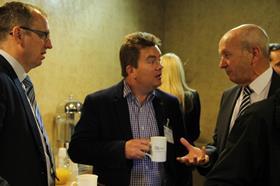
The successful leaders in the fresh produce industry are those who are able to “hover” over their business and use delegation to avoid meddling in everyday affairs, according to two industry experts.
Surrounding themselves with strong employees, who have responsibility for the day-to-day running of the business, leaves the best leaders with crucial time to think, to construct a mental vision for the company, and to plan how to get there.
“Better leaders have a helicopter perspective of their business – they hover over it, they can see where it’s going and how to guide it,” says Max MacGillivray, director of recruitment firm Redfox Executive. “The best business leaders spend 25 per cent of their time thinking: how is this business going to progress? What people does it need? What retailers and products should it be aligned to? What companies do we need to serve us?
“Traditionally, those that fail are the ones where the leader is into everything – they order the printer toner, they choose the toilet roll – they are a meddler,” he adds, before recounting how one company, which was eventually bought out, suffered because its MD was looking at every email that left the company.
In an industry that is famed for its personalities, another key characteristic among the best movers and shakers is charisma – a subtler component of leadership, but one that is immensely powerful. Guy Moreton, director at MorePeople, explains: “Hitler was possibly one of the most successful leaders of all time – he made people do stuff. Leadership is about the ability to carry people forward.
“Most people on the Big 50 list, when they walk into a room the dynamic changes. They sit down and everyone else looks at them – that to me is a sign of a good leader.
“They will have charisma and gravitas. Presence can be taught, but if you are born with it, it’s easy to make it bigger. I’m a big fan of Ian Craig – he’s not loud or brash, but he’s very charismatic and clear about his vision. People who’ve worked for him love him to bits,” he says.
Both MacGillivray and Moreton believe the most influential people in the produce business will have a family background in the sector, and have been exposed to commercial decision-making from an early age. “Often they have also done some kind of course, like the MDS graduate scheme, where they become part of a network of the next generation’s buyers, technical and commercial directors,” adds MacGillivray.
Meanwhile, Moreton believe the ability to make fast decisions is about to become even more important. “Businesses are bigger, and consequently so is the potential for profit and loss, so the impact of decisions is bigger. In today’s business arena everything has to happen now. Added to that, fresh produce is a low-margin environment so there is a lot of competition,” he says.
But the best leadership qualities in the world mean nothing without some level of commercial success. “What is the point of a large turnover but no margin?” asks MacGillivray. “In the future, I think the best people will need to be aligned to the best retailer for their business. Individuals who are stuck in their thinking are there to be had by the retailers.
“An example of good business leaders are the founders of Lovefilm, who’ve now set up snack delivery firm Graze. They have a turnover of £53 million with an EBITDA of £12m, by selling nuts in cardboard boxes. It’s a fantastic example of what someone should’ve done in fresh produce.”
Financial success across all categories may look the same on the surface, but nonetheless MacGillivray believes those in the fruit industry have to be more strategic. “There isn’t much difference across the categories, although senior-level people in the fruit sector are paid more than root vegetables.
“The volumes of imported fruit means there is more money to pay the best people, whereas in root veg the collective margins are lower. You definitely see more strategic people in fruit – they are dealing with multiple languages, countries and currencies – but in every sector the best leaders abide by the saying ‘let go to grow’.”
Moreton agrees that in recent years leadership across the fresh produce industry has begun to look similar. “I think over the past 15 years there has been a standardisation as to the quality of leaders,” he says.
“David Langmead, Tony Reynolds, Ian Craig – if they were all in the same room you would see a lot of the same competencies and personalities. They are driven, quick thinkers, decisive and very charismatic.”
Seeing the sector’s biggest names and decision makers together in one room would certainly make for an interesting networking break, though it would be unlikely to be trivial conversation about the weather. As MacGillivray adds: “The better people always have a plan for the business and for themselves.”



